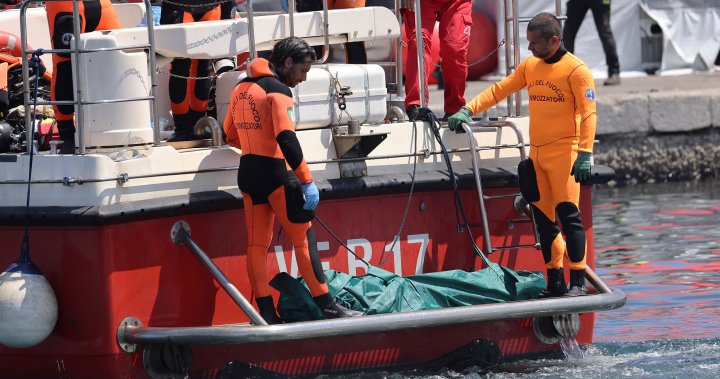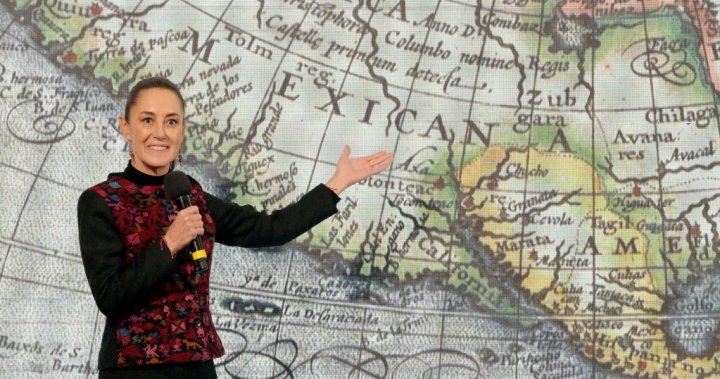Superyacht sinking: Manslaughter charges considered as last body found – National

Italian prosecutors are reportedly looking into laying manslaughter charges in the fatal sinking of the superyacht Bayesian as a final body, believed to be that of 18-year-old Hannah Lynch, was recovered from the wreckage.
The Italian coast guard said Thursday that it discovered the bodies of five people, including the remains of British tech magnate Mike Lynch. At the time, only one person remained missing — Mike’s daughter, Hannah.
A woman’s remains were found by a recovery team on Friday, the Coast Guard said. The body has not been officially identified, but an unnamed source in the Italian government told the Washington Post that the body was confirmed to be Hannah’s.
Photos showed Italian emergency workers hauling a plastic body bag ashore.
“The Lynch family is devastated, in shock and is being comforted and supported by family and friends,” a spokesperson for the family said on Friday, in their first public comment since the yacht sank.
“Their thoughts are with everyone affected by the tragedy. They would like to sincerely thank the Italian coastguard, emergency services and all those who helped in the rescue.”

The Prosecutor’s Office of Termini Imerese is investigating how the luxury vessel, which shipbuilders touted as “unsinkable,” went down.

Get breaking National news
For news impacting Canada and around the world, sign up for breaking news alerts delivered directly to you when they happen.
UK radio network LBC reports that prosecutors are “investigating shipwreck and multiple counts of culpable manslaughter,” though it’s unclear who prosecutors are looking to charge. A press conference is reportedly set up for Saturday.
The captain of the Bayesian, James Cutfield, has been questioned by the coast guard on behalf of prosecutors, along with the other survivors. None of them have commented publicly on how the ship sank. So far, nobody has been placed under formal investigation.
Mike and his family were on board the Bayesian, a 56-metre British-flagged yacht, when it went down in a storm early Monday. The boat had been moored about a kilometre off the Sicilian coast near Porticello. Officials believe the ship was struck by a waterspout, a tornado that forms over water, and sank.
Mike had been celebrating his recent acquittal on fraud charges, stemming from Hewlett Packard’s US$11 billion acquisition of Autonomy, a business software firm he founded. Some of the people who had defended Mike at trial were also celebrating on the boat.
Fifteen people escaped the shipwreck and were rescued by a nearby sailboat, including Mike’s wife, Angela Bacares. One person was found dead on Monday immediately after the shipwreck — the yacht’s Antigua-born chef, Recaldo Thomas.
Six others were deemed missing, though six bodies have now been found as of Friday. Search and rescue divers say they struggled to find the bodies trapped in the yacht’s hull.
“It’s very difficult to move inside the wreckage. Moving just one meter can take up to 24 hours,” said Luca Cari, spokesperson for the fire rescue service.

Questions abound about what caused the superyacht, which was built in 2008 by Italian shipyard Perini Navi, to sink so quickly, when the nearby Sir Robert Baden Powell sailboat was largely spared and managed to rescue the 15 survivors.
The chief executive of The Italian Sea Group, which owns the Bayesian’s manufacturer, said superyachts like these are “the safest in the most absolute sense.”
“First of all, because they have very little surface compared to a yacht facing into the wind,” CEO Giovanni Costantino told Sky News on Wednesday. “Second, with the structure, the drift keel, they become unsinkable bodies.”
Yachts such as the Bayesian are also required to have watertight, sub-compartments that are specifically designed to prevent a rapid, catastrophic sinking even when some parts fill with water.
“So for the vessel to sink, especially this fast, you are really looking at taking water on board very quickly, but also in a number of locations along the length of the vessel, which again indicates that it might have been rolled over on its side,” said Jean-Baptiste Souppez, a fellow of the Royal Institute of Naval Architects and the editor of the Journal of Sailing Technology.
— with files from the Associated Press
© 2024 Global News, a division of Corus Entertainment Inc.









